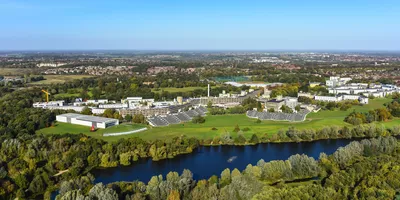How a Mediterranean diet could reduce osteoporosis
By: News Archive

Eating a Mediterranean-type diet could reduce bone loss in people with osteoporosis – according to new research from the University of East Anglia.
New findings published today show that sticking to a diet rich in fruit, vegetables, nuts, unrefined cereals, olive oil, and fish can reduce hip bone loss within just 12 months.
The study is the first long-term, pan-European clinical trial looking at the impact of a Mediterranean diet on bone health in older adults.
More than 1,000 people aged between 65 and 79 took part in the trial, and volunteers were randomised into two groups - one which followed a Mediterranean diet and a control group which did not.
Bone density was measured at the start and after 12 months. The diet had no discernible impact on participants with normal bone density, but it did have an effect on those with osteoporosis.
People in the control group continued to see the usual age-related decrease in bone density, but those following the diet saw an equivalent increase in bone density in one part of the body – the femoral neck. This is the area which connects the shaft of the thigh bone to its rounded head, which fits in the hip joint.
UK study lead Prof Susan Fairweather-Tait, from UEA’s Norwich Medical School, said: “This is a particularly sensitive area for osteoporosis as loss of bone in the femoral neck is often the cause of hip fracture, which is common in elderly people with osteoporosis.
“Bone takes a long time to form, so the 12-month trial, although one of the longest to date, was still a relatively short time frame to show an impact. So the fact we were able to see a marked difference between the groups even in just this one area is significant.”
The EU-funded trial, led by the University of Bologna, was completed by 1142 participants recruited across five centres in Italy, the UK, the Netherlands, Poland and France. Those following the Mediterranean diet increased their intake of fruits, vegetables, nuts, unrefined cereals, olive oil, and fish, consumed small quantities of dairy products and meat and had a moderate alcohol intake.
People in the intervention group were provided with foods such as olive oil and wholemeal pasta, to encourage them to stick to the diet, and were also given a small vitamin D supplement, to even out the effects of different levels of sunlight on vitamin D status between the participating countries.
At the start and end of the trial, blood samples were taken to check for circulating biomarkers. Bone density was measured in over 600 participants across both groups at the lumbar spine and femoral neck. Of these participants, just under 10% were found to have osteoporosis at the start of the study.
Co-researcher from UEA, Dr Amy Jennings said: “Although this is a small number it is sufficient for the changes in femoral neck bone density between the two groups to be statistically significant.
“Those with osteoporosis are losing bone at a much faster rate than others, so you are more likely to pick up changes in these volunteers than those losing bone more slowly, as everyone does with age.
“With a longer trial, it’s possible we could have picked up changes in the volunteers with normal bone density. However, we already found it quite challenging to encourage our volunteers to change their diet for a year, and a longer trial would have made recruitment more difficult and resulted in a higher drop-out.”
The researchers would now like to see a similar, or ideally longer, trial in patients with osteoporosis, to confirm the findings across a larger group and see if the impact can be seen in other areas of the body. If the condition could be mitigated through diet, this would be a welcome addition to current drug treatments for osteoporosis, which can have severe side effects.
But in the meantime, say the researchers, there is no reason for those concerned about the condition not to consider adapting their diet.
“A Mediterranean diet is already proven to have other health benefits, reducing the risk of cardiovascular disease, Parkinson’s, Alzheimer’s and cancer,” said Prof Fairweather-Tait. “So there’s no downside to adopting such a diet, whether you have osteoporosis or not.”
Related Articles

Could ‘digital’ smell training restore your sense of smell?
Researchers at the University of East Anglia (UEA) are launching a ground-breaking project to improve the lives of people affected by smell disorders.
Read more
Nurses worldwide rely on intuition to triage patients
Nurses around the world use intuition to work out how sick a patient is before triaging for treatment according to new research from the University of East Anglia.
Read more
British sex lives revealed in new study
A new study published today shows the number of sexual partners we have changes as we age and there are some surprising results.
Read more